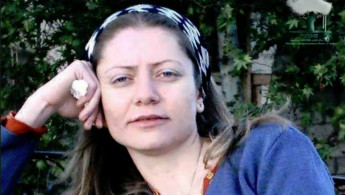Razan Zaitouneh: More clues come to light in search for kidnapped Syrian lawyer
More information has come to light on the disappearance Razan Zaitouneh, one of Syria's most well-known rights activists who was kidnapped in then-rebel-held Douma in 2013.
Zaitouneh, who was outspoken on both the regime's atrocities and the abuses committed by rebel groups, was kidnapped by gunmen from her office in the Damascus outskirts in December 2013 along with her husband and two colleagues.
Her fate has been one of the longest-running mysteries of Syria's long conflict. There has been no sign of life, no proof of death since the evening of her disappearance.
Five years later, bits of clues are emerging: a handwritten threat vowing "I will kill you;" a log-on from her computer after the kidnappers stole it from her office; possible sightings by witnesses and reports of graffiti on a prison cell wall reading, "I miss my mother — Razan Zaitouneh, 2016."
The clues give strong indications that Zaitouneh was abducted by Jaish al-Islam, the dominant rebel faction in Douma at the time. She was was then likely held in the group's notorious Tawbah Prison. Jaish al-Islam strongly denies any role in her disappearance.
Zaitouneh's friends and colleagues told The Associated Press it is likely she has since been killed, but unknown at which point after her abduction she may have died.
Twitter Post
|
Despite hope for Zaitouneh's safe return being kept alive, Syrian regime forces retook Douma in April. She and her colleagues were not found among the released prisoners.
According to an AP team who visited Tawbah Prison, the converted research facility consisted of a dark maze of tiny cells covered in graffiti. Jaish al-Islam is thought to have held hundreds of people there over the years, including opponents.
Zaitouneh, a well-known figure before the war as a defence lawyer for political prisoners, went into hiding as Syrian authorities arrested opposition activists in Damascus. In early 2013, she escaped into rebel-held Douma, the largest town in the eastern Ghouta region.
Despite Jaish al-Islam's denial of any role or responsibility in the kidnappings, more information has come to light through AP interviews with activists, rebels, acquaintances of Zaitouneh and locals from Douma.
Several witnesses say Jaish al-Islam saw Zaitouneh documenting their own abuses and then began to threaten her.
Weeks before the kidnapping, a gunman opened fire in the air outside her office. Soon after, Zaitouneh received a handwritten note giving her three days to leave. "I will kill you. I will kill you. I will kill you. I will kill you, Razan Zaitouneh," it read, according to AP.
Twitter Post
|
A Jaish al-Islam official, Hussein al-Shazli, later confessed in a local court that he delivered the note on orders of the group's command, said opposition activist Mazen Darwish. But the court released al-Shazli after Zahran Alloush, the Jaish al-Islam's leader, intervened.
A former prisoner of Tawbah said she saw Zaitouneh there, and was able to pick out her face from a selection of photos. Several witnesses reported the prison message allegedly scrawled by Zaitouneh about her mother, dated 2016 — which, if confirmed, would mean she lived for several years after the kidnapping.
Attempts to reach other relatives of the missing were unsuccessful. Zaitouneh's sister and mother did not respond to requests for an interview.
Almost all who worked with or knew Zaitouneh are scattered, either elsewhere in Syria or abroad, meaning there is no one to search for her — or her grave.
There are multiple reports on where she and the others may be buried. One figure in Douma said his information was that Jaish al-Islam buried them in al-Ebb, a nearby farm area.
Another possibility is Nashabiyeh, a town several miles away where mass graves of regime fighters were discovered.
Darwish said there is proof Zaitouneh was in Jaish al-Islam's jails until early 2017, after which all information was cut.
"After Jaish al-Islam left Douma, regrettably, the possibilities are headed more and more toward the worse," he said.
Agencies contributed to this story.
Follow us on Twitter: @The_NewArab





 Follow the Middle East's top stories in English at The New Arab on Google News
Follow the Middle East's top stories in English at The New Arab on Google News
![The UAE is widely suspected of arming the RSF militia [Getty]](/sites/default/files/styles/image_330x185/public/2024-11/GettyImages-472529908.jpg?h=69f2b9d0&itok=Yauw3YTG)
![Netanyahu furiously denounced the ICC [Getty]](/sites/default/files/styles/image_330x185/public/2024-11/GettyImages-2169352575.jpg?h=199d8c1f&itok=-vRiruf5)
![Both Hamas and the Palestinian Authority welcomed the ICC arrest warrants [Getty]](/sites/default/files/styles/image_330x185/public/2024-11/GettyImages-2178351173.jpg?h=199d8c1f&itok=TV858iVg)